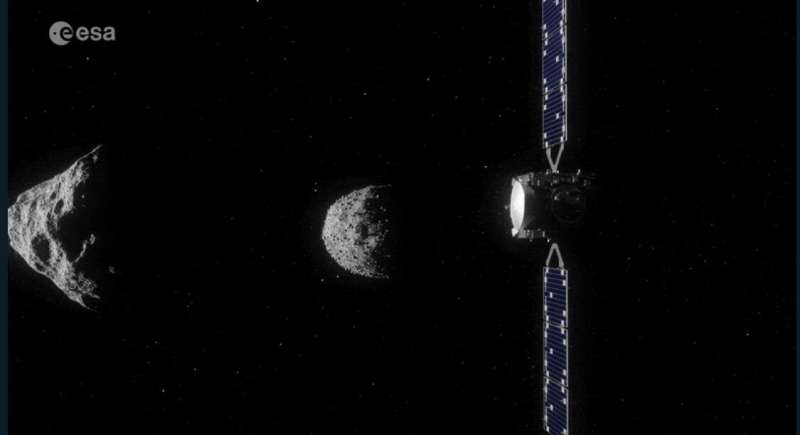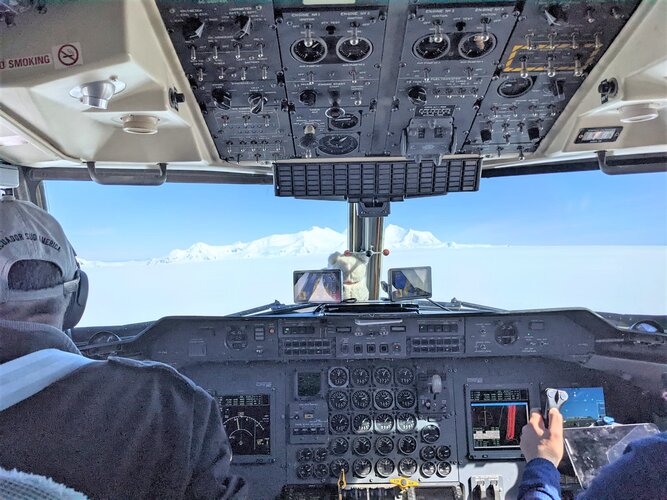
Copernical Team
Microchip radiation-tolerant power management devices will target LEO applications
 The commercialization of the Low-Earth Orbit (LEO) region is transforming space exploration and satellite communication at roughly 1,200 miles above Earth. For satellites to successfully operate and reach their destination, it is essential to select components that can withstand the harsh space environment.
Building on its existing radiation-tolerant portfolio, Microchip Technology Inc. (N
The commercialization of the Low-Earth Orbit (LEO) region is transforming space exploration and satellite communication at roughly 1,200 miles above Earth. For satellites to successfully operate and reach their destination, it is essential to select components that can withstand the harsh space environment.
Building on its existing radiation-tolerant portfolio, Microchip Technology Inc. (N Hera's time of trial
 One of last year's space highlights was the NASA DART mission's collision with Dimorphos (seen right), the small moon of the binary asteroid Didymos (seen left). The impact which measurably shifted the target asteroid's orbit around its primary while casting a plume of debris thousand of kilometres out into space.
Next comes ESA's Hera spacecraft which will return to the binary asteroid to
One of last year's space highlights was the NASA DART mission's collision with Dimorphos (seen right), the small moon of the binary asteroid Didymos (seen left). The impact which measurably shifted the target asteroid's orbit around its primary while casting a plume of debris thousand of kilometres out into space.
Next comes ESA's Hera spacecraft which will return to the binary asteroid to Our Encanto: Sols 3716-3717
 Yesterday's plan executed successfully including a short bump that placed us in front of an interesting block that may just contain our next drilled target!
Before the science team commits to drilling the target "Encanto," we will first investigate the chemistry and composition of the target using APXS, ChemCam, and Mastcam (using their multispectral capability), to ensure that it is scien
Yesterday's plan executed successfully including a short bump that placed us in front of an interesting block that may just contain our next drilled target!
Before the science team commits to drilling the target "Encanto," we will first investigate the chemistry and composition of the target using APXS, ChemCam, and Mastcam (using their multispectral capability), to ensure that it is scien Researches on Chang'e 5 lunar samples gain fruitful results
 More than 50 research results on the lunar samples brought back by the Chang'e-5 mission have been published in notable academic journals at home and abroad, pushing China's lunar science research to the international forefront, according to the China National Space Administration (CNSA).
Over 150 scientists and researchers participated in the first Chang'e-5 Lunar Sample Research Results
More than 50 research results on the lunar samples brought back by the Chang'e-5 mission have been published in notable academic journals at home and abroad, pushing China's lunar science research to the international forefront, according to the China National Space Administration (CNSA).
Over 150 scientists and researchers participated in the first Chang'e-5 Lunar Sample Research Results ALUULA Composites selected for future Mars missions
 ALUULA Composites, a new advanced materials technology firm is pleased to report that its ultralight and strong composite materials have been selected by Thin Red Line Aerospace for future NASA missions.
ALUULA is supporting Thin Red Line Aerospace's development of cutting-edge, critical application hardware for future NASA lunar and Mars missions. "Their unique range of technical attribut
ALUULA Composites, a new advanced materials technology firm is pleased to report that its ultralight and strong composite materials have been selected by Thin Red Line Aerospace for future NASA missions.
ALUULA is supporting Thin Red Line Aerospace's development of cutting-edge, critical application hardware for future NASA lunar and Mars missions. "Their unique range of technical attribut Stars disappear before our eyes, citizen scientists report
 A startling analysis from Globe at Night - a citizen science program run by NSF's NOIRLab - concludes that stars are disappearing from human sight at an astonishing rate. The study finds that, to human eyes, artificial lighting has dulled the night sky more rapidly than indicated by satellite measurements. The study published in the journal Science showcases the unique contributions that citizen
A startling analysis from Globe at Night - a citizen science program run by NSF's NOIRLab - concludes that stars are disappearing from human sight at an astonishing rate. The study finds that, to human eyes, artificial lighting has dulled the night sky more rapidly than indicated by satellite measurements. The study published in the journal Science showcases the unique contributions that citizen Hera spacecraft to return to binary asteroid to survey crater left by DART

One of last year's space highlights was the NASA DART mission's collision with Dimorphos, the small moon of the binary asteroid Didymos (seen left). The impact measurably shifted the target asteroid's orbit around its primary while casting a plume of debris thousand of kilometers out into space.
Next comes ESA's Hera spacecraft which will return to the binary asteroid to perform a close-up survey of the crater left by DART, as well as measuring Dimorphos' mass and make-up, along with that of its central body.
"Hera is due to be launched in October 2024," explains Ian Carnelli, heading the mission. "In order to make that deadline our team has been working hard during the last year to finalize and test the various spacecraft subsystems—including the two CubeSats that will be deployed from Hera itself in the vicinity of Dimorphos. Meanwhile the overall mission passed its system Critical Design Review at the end of 2022, at the same time as Hera received funding for its launcher and operations.
"This coming year is when everything comes together: all elements of the Hera flight model are due to be integrated so that we can perform a full campaign of environmental testing on the spacecraft at ESA's ESTEC Test Center in the Netherlands.
Future-proofing ice measurements from space

With diminishing ice one of the biggest casualties of our warming world, it’s imperative that accurate measurements continue to be made for scientific research and climate policy, as well as for practical applications such as ship routing.
To ensure that ESA and NASA are getting the best out of their ice-measuring satellites and to help prepare for Europe’s new CRISTAL satellite, the two space agencies along with the British Antarctic Survey and a team of scientists teamed up recently to carry out an ambitious campaign in Antarctica.
Airbus and VDL Group join forces to produce an airborne laser communication terminal
 Airbus and VDL Group have signed a partnership agreement for the development and manufacturing of a laser communication terminal for aircraft, known as UltraAir. Based on the development led by Airbus and the Netherlands Organisation for Applied Scientific Research (TNO), the two companies will now prepare a demonstration of a prototype and a first flight test in 2024.
As of 2024, Airbus a
Airbus and VDL Group have signed a partnership agreement for the development and manufacturing of a laser communication terminal for aircraft, known as UltraAir. Based on the development led by Airbus and the Netherlands Organisation for Applied Scientific Research (TNO), the two companies will now prepare a demonstration of a prototype and a first flight test in 2024.
As of 2024, Airbus a Northrop Grumman partners with NASA to shape integration of uncrewed aircraft into national airspace
 Northrop Grumman Corporation (NYSE: NOC) is collaborating with NASA to develop and test solutions for integrating large, uncrewed aircraft systems into the National Airspace System (NAS). The effort will focus on air cargo operations and is part of NASA's Air Traffic Management-eXploration (ATM-X) Pathfinding for Airspace with Autonomous Vehicles (PAAV) subproject.
"Partnering with NASA, w
Northrop Grumman Corporation (NYSE: NOC) is collaborating with NASA to develop and test solutions for integrating large, uncrewed aircraft systems into the National Airspace System (NAS). The effort will focus on air cargo operations and is part of NASA's Air Traffic Management-eXploration (ATM-X) Pathfinding for Airspace with Autonomous Vehicles (PAAV) subproject.
"Partnering with NASA, w 
